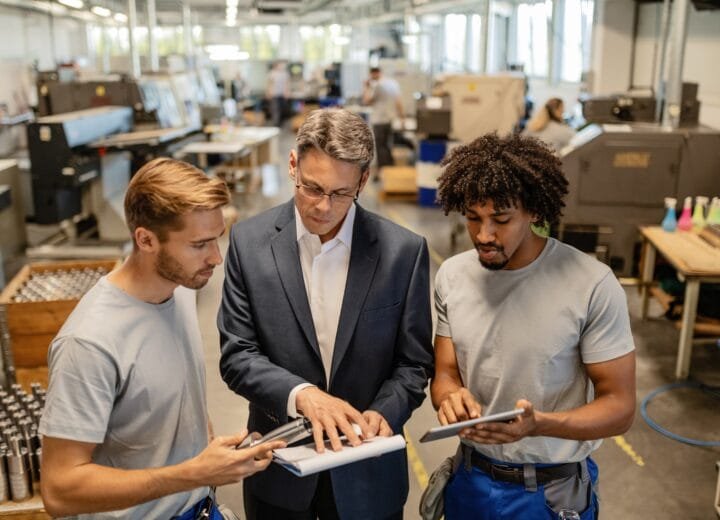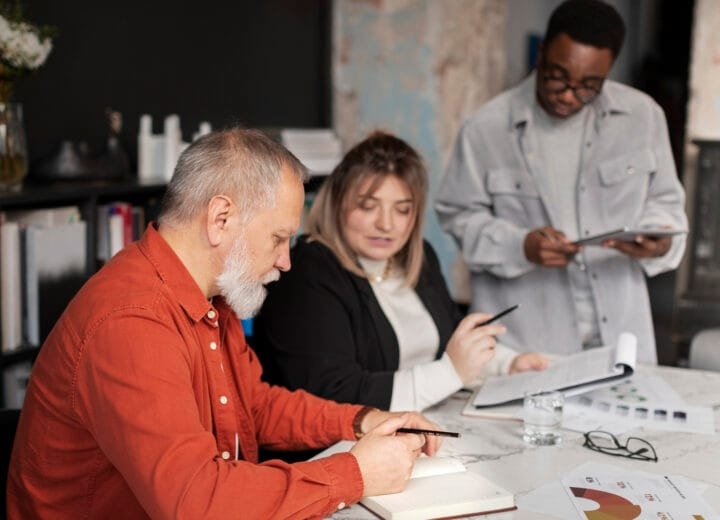In this edition of iFaber, we have brought to you another tale from the floors of one of our clients, which is a reputed global leader in the production of tea from Kenya – Karirana Estates Limited. They have over the years acquired the reputation through continuous improvement initiatives and a professional approach to the management of the tea business. We had a chat with Mr. Joseph Ngige, General Manager, Karirana Estates Ltd. Excerpts of which are mentioned below –
Faber Infinite (FI): We have a subscriber base of around 20,000+ readers across 8 countries, our readers would want to know more about Karirana Estates Limited and about your journey at Karirana Estates?
Mr. Joseph Ngige (JN): Karirana Estates Ltd is an integrated tea company – where we are involved in primary production of tea from growing to processing to packing for export in bulk form as well as in value addition of tea for direct sale to consumers, using our Eden Tea brand. We are an integrated tea company as opposed to a traditional tea company which is just involved in processing in bulks for export. The company has been in operation for the last 63 years, having started in 1956. We are one of the 100 tea companies that operate in Kenya. From the value addition side, we are also one among the 200 tea packers licensed by the Tea Directorate of Kenya.
We started the transformation journey mainly because of the competition that we faced from the 100 tea companies and 200 tea packers who are essentially operating in a cut-throat environment. We wanted to survive as well as create wealth for our shareholders and develop a sustainable way of operations. So we decided to focus on Operational Excellence mainly to help us align our operations and remove all the non-value adding activities in our value chain and basically manage not only cost but also improve the level of productivity. After addressing the operational issues we started looking at other aspects of transformation that is the strategy. We wanted to grow and sustain at the same time. That is where the element of Strategic Excellence came in, to help us identify how to grow our business beyond what other tea companies in Kenya were doing. Not every organization performs well, but we wanted to stand out among the players in the tea industry in Kenya
FI: We understand that the tea industry is affected by both internal as well as external factors, can you share some challenges unique to your industry?
JN: One of the most critical external factor to affect the tea industry is the climate. Tea growing is a climate-dependent activity. The issue of climate change is a critical concern for the tea industry. Irregular rains, longer droughts and extreme temperature conditions are the major concerns.
Over 90% of the Kenyan tea is exported, so we are dependent on markets like Pakistan, Egypt, UK, Afghanistan, Sudan, Iran and UAE. Now the top five markets absorb 80% of the tea from Kenya. Only 5% of the tea is consumed locally, the rest goes for export in commodity form. So that means any happenings in these markets like price variations, political issues, currency devaluation affects us. Besides all the tea is sold in USD so the volatility of the USD also affects us.
Tea is a global commodity so Kenya is competing with all other producers in the world including China and India. However, we are the highest exporters of tea. Another external factor is to manage the price at the global level due to the demand and supply situation. These are a few of the external factors that affect us.
Internal factors include the high cost of labor and wages. Other internal factors include the cost of energy and fuel. We use a lot of energy for electricity and fuel for steam boiler. Infact energy cost is as high as 30% of the factory cost. As a result, the cost of production becomes a significant issue that one has to deal with.
FI: Considering the above, how important is Operational Excellence (OE) and Strategic Excellence (SE) to your industry?
JN: Both OE and SE are very critical. If we begin with OE, we are talking about cost-effectiveness which is very critical to our industry. You also improve efficiency across the value chain and reduce waste across the value chain and improve productivity per unit. So OE comes in handy as it helps to address the effectiveness of the operations and thereby helps you to improve productivity and achieve cost leadership.
In the commodity market, you have to face global competition. Also in terms of value addition, we are competing with 200 packers across Kenya. So we wanted to figure out how to stand ahead of the competition. Tea packaging is a red ocean and we need to find out what we can do differently as compared to other packers. SE is critical to identify strategies that you can pursue to make a difference as compared to the competition and help you sustain growth despite the competition. It gives profit above growth for that matter. So you have SE to help you grow in the market and OE to grow profitably in the market.
FI: Over the 5 years, Team Karirana has been associated with Team Faber Infinite in various continuous improvement initiatives. Can you share more about the journey and the outcomes of the initiatives that have helped Karirana stay ahead of the competition?
JN: Transformation journey has addressed both Operational Excellence and Strategic Excellence. Team Faber has guided us in this journey by giving us support in areas like building cost leadership, building quality leadership, delivering customer service leadership and safety. So they assisted and guided us in implementing activities related to OE like housekeeping activities, inventory management, value stream mapping and application of Autonomous Maintenance (AM) to increase the effectiveness of machines and lower the cost of production. It has also helped us to adapt the lean principles of low-cost manufacturing and high results. For example, you have a machine which is giving a certain output, but by applying lean principles you can improve the productivity of the machine by even up to 50%, without changing the machine at all and that goes a long way. It has helped us in inventory management, where we have reduced the total inventory by 60% and the amount saved is used in other operations because we no longer hold it in inventory.
When it comes to SE, we looked at the markets that are still unexplored. Opportunities exist in which the competition has still not entered. We were able to see these opportunities because of SE. For the last 5 years, we have registered a minimum of 10-20% growth in revenue every year. On account of focussing on Blue Oceans by using our strengths and resources, we have grown both in terms of revenue and profitability on account of the transformation journey that we have undertaken under the guidance of the Faber Infinite consultants.
FI: Can you share how the implementation of the Light House Framework© by Faber Infinite helped your team align with the strategic initiatives?
JN: The Light House Framework© helped us understand our strengths so that we can use them to grow, address weaknesses so that we can convert them into strengths. It also helped us to address the opportunities and look at the threats in the industry. The Light House Framework© helped us to interrogate our operations in great detail. Hence we were able to see opportunities that were otherwise not visible. It also helped us to align everyone right from the top management to the line workers as to where we are heading. We were able to see what our true north is. The Light House Framework© has been very useful, in helping us not only to look at our short term objectives but also to align everyone to the organization’s long term objectives and goals.
FI: Recently your team implemented Performance Management System (PMS), our readers would be glad to know the results of the PMS implementation.
JN: PMS was actually part of what resulted from the Light House Framework©. The PMS aligns organizational goals and helps to cascade the organizational goals to the goals of every employee in the organization. It helps us to break down organization goals to departmental goals and further into individual goals. Hence it helps us to monitor what contribution/ participation every employee is making towards the realization of the common goals at the corporate level.
PMS has helped us increase employee engagement because every employee is able to understand where we are going. There is role and job clarity of what is expected of every person. It is also aligned to the learning and development plan of the human resource. It has also helped us align the employee rewards and recognitions.
It has created a sense of unity across the board and helped everyone to align with the goals of the organization.
PMS has helped us to make SMART goals, to create alignment at the organizational level.
FI: Progressive teams at Karirana believe that transformation is a journey without an end and teams at Karirana have been working on different improvement initiatives, what advice would you give to the organizations who are thinking of embarking on the journey or who have embarked on the journey?
JN: I agree transformation is a journey because every business is operating in a very dynamic environment and the transformation journey helps to keep in touch with the changes that happen in the industry in real-time and to address them so that you remain sustainable. Yes, it is a journey that needs a lot of commitment from the top management. What makes or breaks the success of the transformation journey is the top management commitment. In the beginning, there will be a lot of resistance as the transformation journey is a change initiative and you need to have the buy-in of everyone across the organization. So communication is one of the critical success factors. Every employee should be brought on board to understand why you are undertaking the journey. It should be communicated that this is for the success of both the employees and the company. So communication is very important for a mutually beneficial relationship.
The other important thing is that before you embark on the journey it is important to carry out the gap analysis to really understand where you stand, what are your challenges and pain points, what your weaknesses are so that you know where you are now and where you want to go. This will help you define the efforts that you need to put in. Different organizations will start at different levels and each will take different initiatives depending on where they are and where they want to go. So you should very realistically assess where you are and where you want to go?
You should also use a holistic approach, need to look at various aspects of the business. You need to look at a strategic angle, you need to look at operations angle you also got to look at the people excellence and all that needs to be brought in together to create synergies between the activities that you do. I think the bottom line is top management commitment is the mantra to success and you need to engage all the employees and communicate that you will not grow and stop but you will grow together each and every day.
I think that the mantra that should guide you is that – “Even the Best can be Improved”. Align all your development programs in line with the transformation journey and where necessary get guidance from experts like Faber Infinite since they help you to see what you cannot see on your own.
FI: Kindly share your views regarding the services offered by Faber Infinite Consulting
JN: The assistance that we have received from Faber Infinite Consulting has been excellent. They are one point of contact through which we are able to tunnel all our issues and plans. Faber Infinite is a partner with the organization, they just don’t come and tell you what to do but they come and do it with you, which is different from other consulting firms. Faber walks the journey with you, so they come and become part of the journey with you. They are a part of the implementation team, so what I would say they provide hands-on consulting services as opposed to hands-off consulting which is the norm in the consulting industry. They help you identify the issue and sort it out. We are highly satisfied with the services of Faber. Another advantage is that Team Faber is multi-disciplinary, so when it comes to marketing there will be someone to help you, when it comes to strategy there is someone to guide you, when it comes to operations there is someone who will walk the journey with you. Team Faber understands what needs to be done when it comes to people excellence and they are competent there as well. So it is all under one roof to help you sort the challenges that you have.
We thank Mr. Joseph Ngige for sharing his views and support. Our sincere wishes to Team Karirana Estates Ltd for future successes and growth!
Written and Compiled by Faber Mayuri



